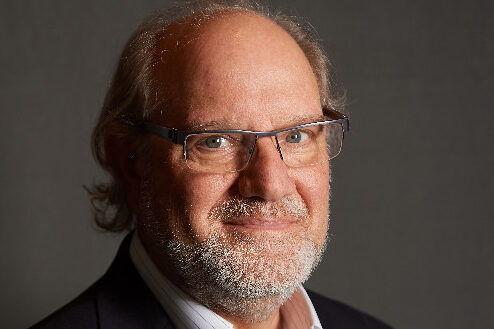Dr. John Mulder, chief consultant for hospice and palliative care medicine for Michigan’s Faith Hospice, was drawn to the field after witnessing his father’s difficult end-of-life experience.
Having begun his practice 40 years ago in family medicine, he came to hospice in 1983 when he was asked to serve on the board of a local provider. He went on to become the organization’s medical director.
“As soon as I became acquainted with what they were doing and what they were all about, it all made sense,” Mulder told Hospice News. “This is what dad needed, but that wasn’t available [when he passed away] in 1980.”
In addition to his role at Faith Hospice, Mulder is executive director of the Trillium Institute, medical director for Holland Home and the director of the Division of Palliative Medicine at Michigan State University’s College of Human Medicine.
Hospice News spoke with Mulder at the National Hospice and Palliative Care Organization’s (NHPCO) Annual Leadership Conference about the ways in which hospice physicians need to adapt to an evolving health care system.

As a hospice and palliative care physician, what’s top of mind for you as you look ahead to 2024?
The world of health care is rapidly changing around us. We’re seeing changes in terms of payment structure, in terms of administrative structure and in terms of regulations, and that covers the entire field of medicine.
As you know, as we grapple with these contradicting things of capitalism while wanting to provide meaningful care to all people. I believe that health care is a right, for every individual who lives in this country.
The changes in the health care system are going to be incremental. We’re going to get changes that will, number one, continue to validate the value of hospice and palliative care in the care of our patients. There’s been a number of studies that really demonstrate that there’s value to patients and families in terms of the level of comfort that they get, the amount of support that families receive and that there’s financial benefit.
What are some of the challenges specific to palliative care?
Part of the challenge is that financial benefit typically accrues to the payer sources.
The company I work for, our palliative service loses money, as many palliative services do. But that’s made up by other folks who are finding some financial benefit from the work that we do, that just doesn’t pass down to us.
So there’s some element of altruism that we put into the work that we do, knowing that it’s right for the community and right for the people that we serve, but that only goes so far. We don’t have limitless pockets of funding that allow us to do that. I hope that in 2024 we will see continued efforts to address the financial landscape and give more opportunities for revenue streams for our hospices and our programs.
One of the things that is clearly on the horizon is more gloomy than not for programs that have not really adapted to value-based initiatives, that are not in a position to contract with Medicare Advantage programs, that are on the outside of [Accountable Care Organizations (ACOs)], that are not part of integrated health care systems.
These programs find themselves without a lot of clientele and without a lot of referrals. I fear that we’re going to see some erosion of some companies. We’ll see some of the smaller hospices go out of business. We will see others acquired by larger systems that would have the infrastructure to continue to support an effort in that area.
To your point regarding value based care, I’ve had a lot of discussions about how organizations should adapt. I’m curious about how the physicians themselves should adapt?
I began my practice 40 years ago this year. There was still some element of idealism that where we’re developing these strong relationships with our families and our patients and we didn’t really necessarily care what’s going on out in the regulatory world or payment world.
Then, with the industrialization of medicine, and in hospitals and networks and our purchasing practices, now we’re getting into the business of managing physicians.
I still teach at the Michigan State University School of Medicine, and I can’t tell you the last time that I heard someone say, “I’m gonna go practice on my own.” They are always going to be part of a system through which they will be employed, and that was not a model that existed 40 years ago when I started practice.
They’re going to need to recognize that how they are measured on their performance is not going to be simply how many patients they see and how much revenue they generate. What are the outcomes of their patients? How did they thrive? How do physicians perform? How did they do relative to coworkers?
I think that as long as there’s a fee-for-service component of this, there will always be a productivity incentive that the physicians have to abide by, and they’re gonna have to see so many patients over a period of time or they will be considered underperforming.
It’s kind of ironic that within the value-based systems, we would think that the value is how the patient responds. If they’re content and happy and get a good outcome, then that should be enough. On a fee-for-service basis, that’s not enough. So there has to be a marriage of those types of values.
As we move forward, I don’t know that we will ever fully get into a totally outcome-driven, value-based system.
Similar question, but how do physicians need to adapt to the changing regulatory environment right now?
The simple answer is that they need to know the law. Our trade organizations are pretty good about making sure that they’re informed. They should be keeping us apprised as to what the regulatory changes are that are going to impact our practice.
We now have to do something technical, such as the types of building codes we use with criteria for those specific codes. That might be part of it.
It might be more like the [Medication Access and Training Expansion (MATE) Act]. That requires all physicians who prescribe and nurse practitioners and physician’s assistants. Anyone who was prescribing controlled substances has to complete eight hours on substance use disorder and opioid prescribing. Those are the sorts of things that we’re seeing more and more.
Different states also have different rules. I’m now in Michigan, which requires [diversity, equity and inclusion] education for physicians to to maintain their licensure.
We’re going to see those sorts of changes continue to creep into the reality of physicians.
I think that navigating the technology is gonna be another challenge that physicians are going to continue to face.
Companies featured in this article:
Faith Hospice, Holland Home, Michigan State University, National Hospice and Palliative Care Organization, Trillium Institute



